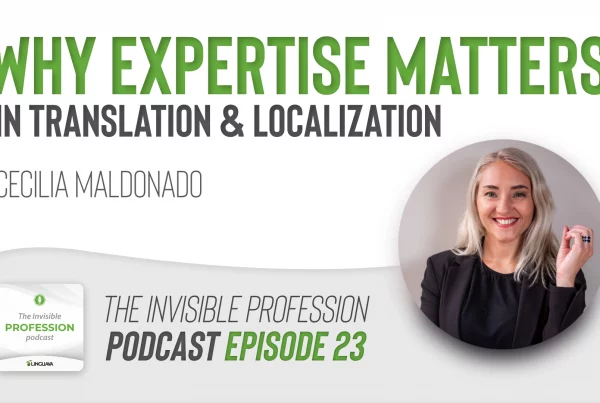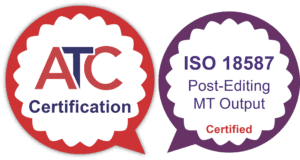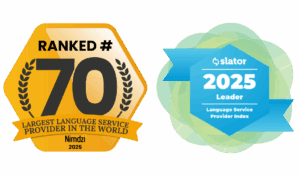French simultaneous interpreter Mike Lemay takes us on his journey of how he became one of the most requested interpreters in our industry. His secret… never panic in the booth. Learn exactly how he stays calm even in the most challenging situations.
Listen to our podcast on all your favorite platforms. Follow the link below https://anchor.fm/theinvisibleprofession
Listen to Linguava’s podcast on all your favorite platforms here.
Connect with us on your favorite social site:
LinkedIn | Facebook | Instagram
At Linguava, we are dedicated to reducing communication barriers and providing equity to all members of our community through language access services.
If you are interested in learning more about incorporating language access into your business or would like to book a training session, contact us today.
Transcript – The Invisible Profession Podcast Ep. 014 – Mike Lemay
Welcome to the Linguava podcast The Invisible Profession. We give you tools, tips, and resources in medical interpretation and translation that help bring to life our profession and ultimately help improve health outcomes with the Limited English proficient and Deaf and Hard of Hearing community.
David: Good morning, everyone. Welcome to the Invisible Profession Podcast, episode number 14. I am super excited today because we have a very special guest. A lot of people have been asking, Hey, you’ve got to get this guy on the podcast. Cause he brings it every time he’s got great energy, great content. And everybody loves him.
The hashtag hot sauce interpreter, man himself. Bam, Mike, the interpreter. Welcome to the podcast.
Bam! Hashtag Hot Sauce Interpreters. Yeah. Yeah. Great to have you on the show, Mike, super excited to get to chat with you.
Mike: Awesome privilege, man. Thank you so much.
David: I think for interpreters, as it can be really lonely in, in our field sometimes.
It’s really nice to be able to connect with people like yourself hear their story and see how they could also expand their career. So I want to get into that a little bit.
Mike: Yeah, exactly. Yeah. That’s pretty cool. Cause actually, you know what? I found that I started a few years ago using Instagram.
Right. use it for a personal and a, in a fun way. I started connecting with a community of interpreters on Instagram, and I was so surprised that there was actually, interpreters out there on Instagram and it blew up into something and then the hashtag started and that kind of went viral in a sense.
And now we’re like 9,000 posts, people following the hashtag. And we created a WhatsApp group of, a certain, like an inner circle of interpreter friends. And, it’s really being a a godsend really, I would say, honestly, in 2020. Most of my work came from networking with interpreters on Instagram, which is pretty amazing.
I get more work from Instagram than I do from LinkedIn.
David: That’s really fascinating. Well, I think that’s so important for everyone to hear it. I love your content and it was great. Great to be able to connect with you and awesome that we’re now getting to do this and after reading your bio too, I think it’s really a really interesting story that you have of how you got started as an interpreter, I think it’s really interesting hearing everyone’s stories and being able to be able to share that and hopefully being able to inspire others as well. You grew up in it was in Quebec?
Mike: I, well, actually I was born in Toronto. My parents are both French Canadians. My father had a business in Toronto for a few years, so I was born there because I was born in Ontario.
I was allowed to go because there’s a special law here in Quebec that when you’re a French Canadian, there was a law back then where you weren’t allowed to go to English school. It was kind of like the protect the language and the Quebec but because my, I was born in Toronto and I had started in English school over there when we came to pick it back very early on, like, I was five or six years old and it’s a beautiful city by the way, my wife and I just went there a year ago.
David: Beautiful.
Mike: Yeah, it is. I’m in Montreal now, but so yeah, so I was allowed to go to English school, but the thing was the caveat is that my mother doesn’t speak English at all. And she’s hearing impaired. And so coming home, I’d speak in French to mama all day and going to school speak in English.
Perfectly immersed in this perfect bilingual world. In addition, like I said, in my little write up there is that because my mother was deaf, I had to do a lot of transactions for over the phone, spending through the landlord, speaking through, the electrical company, no, from a very young age because my father wasn’t very present in the home, unfortunately.
So I had to do a lot of the communicating for my mother. And so I found out later about this phenomenon called, child interpreter. And I said, what that’s it? That’s it. I, that’s why I was kind of predisposed to becoming an interpreter without even knowing it, because I was always interpreting from my mind and it was always pretty much, consecutive.
Right. So you’re going back and forth, mom’s saying something and then repeated on the phone and then repeat that back into the French language from my mother. I was predisposed to it. And then later on, I, at the age of about 13 or 14, I became a Christian. My mother was going to a Christian Church and I accepted the Lord as my savior and you know., I grew up in the Christian Church. And then later in my, I don’t know, like in the late eighties I was starting to get really involved in church and, volunteering and that we would receive English American speakers to preach in our French Canadian churches and I had seen other interpreters and honestly, I was like, oh my. They’re doing a really bad job, I, there were friends of mine or people I knew and you were trying the best you could. I’m sure. Yeah. I was like, oh my gosh, I think it could do better than that. And I never did this. I never heard about it.
I just said, well, I can volunteer. Hey. So I went to see the person in charge of that volunteer program. And I said, listen, I said, I’ve never done this before. I said, I’m, bi-lingual. Yes that I have no credentials, no degree, no nothing, but I said, I speak very fast, French and English. And I think I can do this.
So one day we received a remember that the speaker’s name was Mike Murdoch and he had a very Texas roll accent, and love the guy. And he was a fast talker. And so in front of like 800 to a thousand people, they said, okay, Mike you’re interpreting tonight. So it was like, this was like a, a major conference.
It was like a three-day weekend, Friday, Saturday, Sunday. They view my big debut on stage, but it was still funniest guys. I have no experience. Right. So I just show up on the stage and I stand 10 feet away from the speaker and he starts preaching. I just tell him, I said, give me sentence by sentence. So we’re going back and forth sentence by sentence, but I want to put, he stops and he looks at me.
He says, Mike, what are you doing over there? It’s like time. I come, he says, come closer, come and beside me, right. Shoulder to shoulder. So I’m there shoulder to shoulder with him and he’s going, he’s energetic and going at it, like an American preacher would and you would expect, and I’m just standing like straight, like a piece of stuck wood, and he says, well, he looks at me. He goes, well, Mike, he says, if I jump you jump, if I move my hands, you move your hands. And he’s telling us in front of 800 to 1,000 people’s cause Mike says, if I move, you move. If I jump you jump, if I scream, you scream, he says, if I laugh, you laugh. And so I said, oh, I could do that.
That’s like acting, So I said, sure. I could act that now. So I started interpreting as more with the mindset of like, I’m acting out what this guy is doing, really marrying it. And I can’t explain it besides the fact that, between Christians, we know that anointing factor factor the factor of that. I just had it, it was a natural.
It was amazing. And it was that I hit in the sense that they were always asking me after that, to do that in that I kind of like really rolled into it easily. And with one of the guys that was actually saying we had the chip, that interpreter chip in the mind. Right. So it was actually, it was just the, it was a gift.
I call it a gift of God because it’s been a blessing in my life to the highest degree. And then more and more preachers can come in and accept the interpreting and a consecutively like that. Sometime down the road. At one of those conferences an interpreter came up to me and said, Hey, Mike, he says, where do you work?
I’ve never seen you before. I said work. You can make money with this. He says, yeah, let me introduce you to a few people. He says, I have a gig that I, he’s a freelancer, but he has his own assignments. And to this day I still work with him. He’s still hired me. And so he actually hired me to do a an assignment for him.
And then he introduced me to two, three agencies. The agencies didn’t ask any questions. They didn’t ask for my credential. And they didn’t ask for degrees or anything, they just say, oh, you know him. Okay, well, you could go. So I was in the booth the first time. I didn’t even know how to. And and it just, again, I even more in, in booths than consecutively, obviously.
So it just from then on, it just exploded into a part-time job at first. And now I must say that it’s I have another company, I do ventilation air balancing, and I’m actually thinking of putting that aside to do full-time interpreting. So it’s really, yeah.
David: Love, love that story. It’s really cool.
How you got started in that. And one of the things that you mentioned to me as well, and we were we were emailing back and forth. As you said you mastered the ability. I wanted to be able to ask you about this semester, the ability to never panic in yeah. As interpreters.
We don’t know what’s going to come. We don’t know what’s going come out. As we don’t know, we don’t know exactly what’s going to be said. And sometimes we get a guide or a manual, which is great, or a program, but not always. So yeah, it can be a little bit nerve wracking. Right. Not knowing exactly what’s going to come.
So how does, so as far as your mindset, how do you get prepared? Stay prepared and stay calm, biggest keys?
Mike: We don’t hear about that often, but I think it’s very important to, especially for the new interpreters is that the first time is when I was in the booth. You kind of, you’re interpreting and then you kind of lose the, you know, you lose it and then you, whoops, you lose a sentence and then you’re trying to figure out the first sentence, but the guy’s already in the second sentence and the third, and he’s almost a paragraph away and you’re struggling in that point.
You start, I started sweating beaads. I was literally sweating. And then I just realized, what, if you can’t cry over spilled milk. So sometimes I lose a word. Sometimes I lose a few words. Sometimes I may even lose a sentence if the speakers are very fast. And I just decided, I said to myself, okay, I can do nothing about those last words.
And it’s going to be worse. If I try to catch up and try to fix the situation, I’ll actually make it worse. And cognitively, I just couldn’t take all that. It was an overload. So I just decided, okay, I’m not going to stress over this. If I drop it, I dropped the ball. Just pick up and keep going and forget it, so, I just, at one point I decided that and now I’d say it serves me well and I don’t sweat as much. It still does happen, and we’re put in circumstances and situations or topics that we’ve never spoken about before, where we don’t know the terms very well. I’ll still sweat a bead every once in a while, but I managed to stay calm and yeah, so I would say that is one of the keys, I remember one instance I was working with another young interpreter, actually, she was more experienced than I was, and we were in the booth and this very fast talker came up speaker and I could see that on her shift, she was really struggling. She was actually looking at me and I didn’t know that the signals at first, and she was like begging for me to take over, and I just turned and. I said, okay, you want me to take it? And she said yeah, And I just had to get them fast gab, and that really has given, getting me out of, lot of difficult situations. The fact that I could speak very fast. So I was able to save that situation, that interpreter afterwards, like thank me because they just couldn’t catch up anymore.
They just couldn’t hold onto what was being said. And actually that same day I found out that I was being relayed. I knew nothing about relay. And I had other booths and other languages that were actually relaying off of me. And they came to me afterwards and said, wow, we really loved the content that you were giving us because you were giving us a mouthful, not just like, bits and pieces of sentences.
So, to this day, those interpreters, they love to do relay off of me because I give them a lot I wouldn’t say filler, but because my decollage is very short. I’m always, giving something down there. Other interpreters have a decollage it’s very long. And they’ll give a big gap or a big delay.
And I think in doing relay, that gives a harder time to those using the relay. Right. And so that’s another interesting story, but definitely staying calm in the booth, keeping things cool, calm and collected, but like to say as well is very important because you’ll just lose it. And then, your vendor manager would notice it and then call you up anymore.
David: Right? So, and one of the, one of the questions that I get from time to time from interpreters is how do I make that transition from being a consecutive intern? To a simultaneous interpreter. So what kind of tips or recommendations would you make for those interpreters who want to get started in simultaneous the simultaneous world?
I mean, there’s, there are some training courses out there. There are some workshops, things like that. There’s not really, there’s not really a certain credentials for that, but what would you say to someone who wants to really get started?
Mike: I’d like to start off by saying that I’ve never done true consecutive.
When I say consecutive, it’s more, I like the qualified as a simult-consec. Right. Because when I started in church, I would just tell the speaker, listen, don’t give me more than two sentences or I’m going to butt in. I, I’m going to force myself. And I’ll just start talking over you. So I would always tell that to the speaker and they knew and what’s, and you’ve probably seen this in church, but there’s this nice dynamic that happens between the speaker and then the interpreter.
And it’s beautiful. It’s really like, it’s anointed real, right. And you got this energy, the synergy that’s going in, it’s going back and forth. Boom boom. And it’s just like, it goes very well. That’s the extent of my consecutive. I was never a note taker. And to this day, still don’t take notes.
I do have on a rare occasion, I have some clients that do require me to do consecutive, but even there I tell the person one sentence, two sentence maximum. So that’s the extent of my consecutive. Yeah. To go. I’ve heard that, both sides. Some people say it’s easier to go from consecutive to simultaneous.
Some think it’s easy to go from simultaneous to consecutive. For me. I personally think that simultaneous is easier because you don’t have to wait. You could start right away. Your rendition, you don’t have to, as soon as it’s in your mind, remember that you don’t know exactly. I think that it’s less cognitive overload to do simultaneous.
But that being said I’ve heard it the other way as well. I’ve heard this morning in my WhatsApp group, actually, what we were talking about that a student was asking how do we prepare for consecutive and one consecutive interval was saying, I find actually consecutive easier because it gives you time to think you’re writing down.
You could, prepare your notes, but I tried that and I just can’t manage to write quick enough and enough or of what I need to make an intelligent sentence. So I think that going from consecutive to simultaneous is like so much easier and much more fun. I think less stressful. If you’re not a people person, you don’t standing in front of the crowd, a lot of interpreters.
Although that being said, I find that a lot of interpreters are extroverts and translators are introverts. It’s so funny. When you go in meetings of translators and interpreters, you can recognize them right away. The interpreters are in a corner. They’re yapping away. They’re talking with their hands and they’re moving and they’re dressed up with colorful, extravagant colors.
And then you have the translator there in one corner. They’re very quiet beige, black, white, colors, very dark. So it’s funny to see that, but definitely I think simultaneous is easier than consecutive.
Yeah, no
David: I feel the same way. I think for some time, for some people just simultaneous just comes more natural and that’s what it was like for me too, as being able because I just kind of trained myself on on simultaneous. I was studying to be a court interpreter and I was doing the. The Holly Mickelson. I don’t, if you’ve heard of her, she has,
Mike: I’ve heard the name. Yeah.
David: There’s some training courses and I was listening to the back then cassette tapes, listening to those and it was great for just being able to regurgitate the information. I mean, you could do the same thing with any YouTube video of just play YouTube video and then just try to be right there with them. It’s great practice. You can do it with radio.
Mike: Oh yeah. I do that too. Yeah. Some people call it mirroring. Some people call it shadowing. I do that. I do it naturally. Right. You’re watching TV and I’m interpreting. I says, that’s it. This is what you never turn it off. I can’t turn it off. I’m always interpreting. If you’re reading through it, I listen to the radio. I’m interpreting. I’m trying to, oh, this is a subject.
I don’t know. Let me try it. I’m in my mind, I’m driving and I would have.
David: So tell me one of, one of the the most, most challenging scenarios you’ve been tossed into it. And you mentioned the one with the the fast-talking preacher.
Mike: One of the first times that I was in the booth as well.
I was invited to interpret, I had a booth partner and we weren’t competing in this big, huge conference here in Montreal. It’s, these top notch executives that are invited to speak about the success. They’re millions of dollars, sports celebrities, business, celebrities, people with big names.
And we had the prep material in advance and I was still nervous. I just, I took all the prep material and I translated everything. I worked over night. I basically didn’t sleep the night before. I translated on paper, everything that I had, bios messages the PowerPoints and I had that all in front of me.
And then when my turn came around for one of the speakers that speaker did not give his speech. And he kept repeating and he was actually one of the speech writers for one of the American presidents. His vocabulary was so rich, so amazing. So in-depth and my, just my level. My level was like kindergarten compared to what he was saying.
Right. And I’m looking for my words, I’m searching for my, by default. If something goes wrong, I would use what we call, English French. I, he’s speaking in English. But I use an English word as a French word, replacing it because you’re in Quebec. Honestly, most people understand English, back and forth.
I mean, it’s the two official languages. So I kept using this one word, but I would use the English form while I’m interpreting in French. Right. Yeah. And then my phone, my cell phone on my desk starts vibrating and she says that my vendor says, get out of the booth. So when my turn came over, switched over to my buddy.
I went out, she says, I’m so sorry. She says I’m not that major. I’m just like, a supplier. She was like a, a second in line. And she said, one of the major companies heard you interpret and they don’t like your interpreting. They find that you’re not good. So they had to call another interpreter friend of mine that I knew, and they called her in to replace me.
I was heartbroken because at this point I was wondering, okay, maybe this is not for me. This wasn’t the beginning when doing it in the booth, I was like, oh my gosh, maybe I’m in the wrong place. The imposter syndrome. Yeah. I weeped. I was crying because I was, it really hurt me that, I wasn’t prepared and it just so happened.
It was for that one speech that I wasn’t prepared for.
David: You were more prepared than you’ve ever been, except for that one, one individual.
Mike: Yeah, exactly. So I mean that, that really, that put a stop. I was really wondering in case it was for me, but then I just okay. Get over it and that’s the reason, the funny one too, because that interpreter came to replace me was a woman, friend of mine actually at that time, I didn’t know her yet. And we crossed eyes and she knew she was replacing me because I was doing a bad job. Right. So, yeah, from that point on every time I would meet that interpreter, I was like, oh my gosh, it’s her again. I must have a bad reputation with her, and at one point I even worked with this person in the booth and I was like, I was so ashamed. I felt like, like, I wasn’t good enough. And when I would work with her, I would think like, okay, I’m not good enough. I’m not this. I’m not that. And she would see, she had a nice spirit about it.
She was correcting me or giving me words, passing, slipping the paper to me and all that. But I was still so ashamed and I wouldn’t talk to her, and then one day we met up in a meet where there was translators and interpreters. And I said, okay, I got, this was like a few years afterwards.
I said, I have to go see her because I got to break this tension that we have together, and ended up going through a face-to-face. I said, listen, I said, you remember that time? She says he asked me to replace her she’s so, so you remember this story vividly? I said, like I said, I’m so sorry and we kind of made friends.
We connected actually from the end, we had family connections that we didn’t even know. So I was like, wow. And she turned out to be like, an amazing interpreter, but it turned out that I created this tension for nothing and she was already laughing about it. We were laughing about it, the moment it was done.
Oh yeah. Yeah. So yeah, the deposition one was pretty much the hardest one, I would say.
David: Wow. Yeah. Well, and as interpreters, people don’t, they’ll think about the fact that we are still human and while we are just as a conduit, taking the language from one, one to another, we’re still right there and it sometimes can be challenging to remove ourselves from the situation.
I remember one time I was interpreting as a medical appointment and it was for labor and delivery. So I was like, okay, great. I got the call went in there. I went to the hospital, didn’t know any other information. Just that it was labor and delivery. So I was okay, so we’ll walk in the room and I see the grandmother holding the baby, see the parents sitting on the bed.
And like the nurse was there and then like, okay, great. Oh, the interpreter is here. So they started going over some medications for the mom so I started interpreting that. But I noticed the mood in the room was really sort of down and I thought, Hey, they’ve probably been, they could have been in here for 36 hours.
They’re probably all exhausted. Right. And so it was interpreting. And then the nurse stepped out of the room real quick, had to go grab, grab some paperwork. And I was just standing there in the corner of the door was open. And I turned to the parents that I, you know, just cause it would just seem with the mood, seemed kind of down.
And I stepped out of my role for one second. I just said, Hey, well, congratulations on your new baby. And they let me know that the baby had passed away. It was a stillborn and the grandmother. And then I looked closer at the baby that the grandmother was holding was in the baby was blue.
And so. I was just like, oh my gosh. And I felt, it felt so terrible, for saying that and for not knowing the situation going going in, cause we don’t know a lot of times what’s going to happen and we have to carry that weight, and then we have to move within, like you said, we have move forward.
I think interpreters were the quintessential role of having just to move forward because if you made a mistake, if you missed it, And or whatever happened, you gotta be able to move on. And it’s not always easy, but yeah.
Mike: Wow. Yeah. That’s hard. That’s hard. Yeah.
David: Yeah. Couple more questions. And then also I want to ask you how people can best connect with you. I know you’re well, well connected and all social media platforms. Where can people best, best find you?
Mike: Best find me, obviously well on LinkedIn under Mike Lemay.
David: And we’ll put that on here.
Mike: Instagram. It’s Mike, the interpreter, one word and WhatsApp but if they connect with me on Instagram and on LinkedIn, that’s just fine in my my email address is miketheinterpreter@gmail.com. So I’m in nice and simple and follow the hashtag #HotSauceinterpreters. That’s awesome, man. There you go.
David: All right. And if you could leave one, one message for the for the interpreter community, what would that be?
Mike: Wow. I would say that this profession is it’s an adrenaline rush. It’s a roller coaster ride. If. I just love, I love the rush, the adrenaline rush, literally of going in the booth, coming out of the booth to feeling like Superman.
But other times you feel like really discouraged and feel like a total imposter, but we all feel that, you get the highs to get the lows, but a lot of times. It’s so exciting because you get you get to interpret for very simple stuff, and then you get to interpret, like, I got the privilege of interpreting for our prime minister in in a conference at one point, it wasn’t like, publicly out there, but it was in the conference and it was like, wow, I got to interpret for the prime minister, and pretty cool.
And so you get the highs, you get the lows and you feel good. It’s a very you have to be very emotionally strong because you will hit the the highs, but you have to, balance it out and know that even if you do hit rock bottom and you will hit rock bottom, there, there are those times where you really you’re really goofy, really bad.
And then there’s other times where you just come out of the booth and you’re just like, yeah, man, I just hit it out of the ballpark and you get the call backs and then, you keep getting calls. And so, yeah just continue, keep on keeping. A state be brave, be courageous. I like to say, some interpreters disagree with me, but I like to take a challenge, even if I’ve never done it before.
Some people say don’t touch it. There’s some stuff I don’t touch it. I don’t, that’s legal, I don’t touch medical. But anything else I’m willing to try at least once. And I find that when I was like, Hey, I can do this. And it, it increases the volume of work that you get.
Right. So stay calm. Definitely. That’s a key stay cool, calm and collective, and know that you’re not a dictionary. And it’ll never be perfect. Never be perfect. It’s you’re always going to slip up somewhere, but just. And the end of the day, most people will come to see you anyway and say, wow, that was great. I love what you did and they’ll call you back.
David: Great message. Thank you so much for tuning in here with us this morning and being able to learn from Mike, the interpreter, hashtag hot sauce interpreters, himself. And if you liked this episode and want to share it as well, we would be very grateful for that share with your community and like, and subscribe to to our YouTube channel and let us know what other content you’d like to hear. What other guests you’d like to hear. And Mike, it was so great having you on the show today.
Mike: It was awesome. And we had a great time. I can’t wait to see it.
David: Yes.









